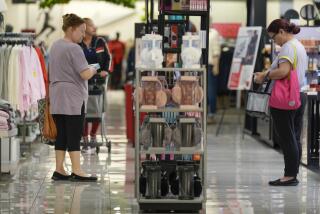Economy of Japan Grows Unexpectedly in 1st Quarter
TOKYO — Japan’s economy grew by an unexpectedly strong 1.9% in the first quarter, providing some preliminary evidence that the world’s No. 2 economy might be emerging from a prolonged downturn that has worried policymakers around the globe.
If Japan’s gains continue--although caution or outright skepticism was the dominant reaction to Thursday’s news among analysts here and abroad--it would be the most important step of all in Asia’s recovery from a 2-year-old economic crisis.
The growth after 15 straight months of contraction appeared to be relatively broad-based, with consumers, companies and the government all contributing. Japan’s stock market reacted with glee as the benchmark Nikkei index gained 480.12 points, or 2.9%, to close at 17,102.62. Other markets across Asia also soared.
Several economists, however, said the growth is not sustainable, nor do they see any meaningful rebound in sight. And while Japan may be a little less of a drag on the global economy, it is still not contributing anything.
In Washington, Treasury Secretary Robert E. Rubin, who has pressured Japan for more than a year to stimulate its economy and help pull the rest of Asia out of recession, was especially cautious.
“My instinct is that individual quarterly numbers don’t give you much sense in and of themselves about what’s happening in an economy. We’re going to have to analyze them,” Rubin said. “Clearly, they have enormous challenges ahead.”
Weakness in Japan and slowing growth in Europe have created enormous pressure on the United States, which is the only major economy healthy enough to absorb the world’s goods. Rubin and Federal Reserve Chairman Alan Greenspan have warned that the U.S. economy cannot remain an “oasis” and will weaken eventually.
However, Japan’s latest numbers, on the heels of sharp improvements in growth in the key economies of Germany and South Korea, were reason for optimism.
Analysts in Tokyo scrambled to upgrade their quarterly forecast after being caught off guard by the strong performance.
“This is amazing,” said Michael Naldrett, economist with Dresdner Kleinwort Benson. “I was on the more positive end, but it’s still a bit of a gobsmacker.”
In fact, some analysts said the relatively strong 1.2% jump in consumer spending was so good it bordered on the unbelievable, given Japan’s rising unemployment, slumping department store sales, falling real wages, deflationary pressure and general gloomy outlook.
“This is something I just can’t understand,” said Shinichiro Kawasaki, analyst with Daichi Life Research Institute. “We hear anecdotes about higher PC and small-car sales. But that still doesn’t explain it.”
The good news was not lost on the politicians. Several analysts said they expected Prime Minister Keizo Obuchi, who has staked his 10-month administration on an improved economy, to call a general election as early as October in a bid to capitalize on the upturn. Under Japan’s parliamentary system, the government must call a vote before the fall of 2000.
“They’re going to be toasting each other tonight,” said Hiroshi Kuribayashi, economist with Barclays Capital Japan Ltd. “They can now say their stimulus packages were very successful. . . . It’s likely the election will be earlier rather than later.”
Analysts credited the government’s spending spree along with a series of statistical anomalies for the strong January-March showing. Public works spending rose 10.3% during the quarter on the heels of last year’s $203.3-billion supplementary budget as new roads, bridges and rock piles started springing up around the archipelago.
The government’s loose purse strings also boosted parts of the private economy. Analysts say a $169.5-billion emergency program extending loan guarantees to smaller companies helped produce a temporary uptick. Capital spending rose 2.5% during the quarter, although machinery orders are expected to fall again in the April-June period.
A government program to encourage homeownership through low-interest loans and other measures also helped boost housing investment 1.2% in the quarter.
But analysts wonder how long the government can keep up this torrid pace without running out of money or pushing up interest rates to a point at which they topple shaky companies and financial institutions.
That danger hasn’t seemed to faze legislators, however, several of whom have expressed a willingness to allocate as much as $82.6 billion more for public works and job creation later this year.
A random sampling of consumers, meanwhile, expressed skepticism that the “real” economy beyond the world of government spending programs had much of a pulse yet.
Consumer confidence is key to any sort of sustained economic turnaround because consumer spending accounts for about 60% of Japan’s economy. And everywhere consumers turn, companies are laying off people.
Recent restructuring, layoffs and cost-cutting by companies such as Sony, NEC, Mitsubishi Electric and All Nippon Airways, along with a record-high 4.8% unemployment level and falling real wages, have sharply undercut consumer confidence.
“I really can’t believe Japan’s economy is getting any better,” said Atsushi Matsushita, a 31-year-old systems engineer. “Since I don’t know what will happen in the future, I’m very careful not to spend much money.”
And while government programs now make homeownership more attractive, said Yumi Ko, a secretary at an insurance company in Tokyo, there’s too much anxiety to think about making such a huge purchase.
“It’s really scary, especially after another life insurer collapsed last week,” she said. “I always thought restructuring was someone else’s problem, but now it could be mine.”
*
Etsuko Kawase in the Tokyo bureau contributed to this report.
More to Read
Inside the business of entertainment
The Wide Shot brings you news, analysis and insights on everything from streaming wars to production — and what it all means for the future.
You may occasionally receive promotional content from the Los Angeles Times.










